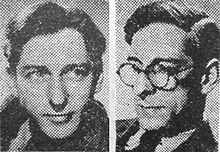John and Roy Boulting
| John Boulting | |
|---|---|

Roy (left) and John (right) Boulting, 1952
|
|
| Born |
Joseph Edward John Boulting 21 December 1913 Bray, Berkshire, England |
| Died | 17 June 1985 (aged 71) Sunningdale, Berkshire, England |
| Occupation | Film producer and director |
| Spouse(s) | Veronica Davidson (1938–?) Jacqueline Duncan (1952–1966) Ann Marion (1972–?) Anne Josephine (1977–1985) |
| Children | 6 |
| Roy Boulting | |
|---|---|
| Born |
Alfred Fitzroy Clarence Boulting 21 December 1913 Bray, Berkshire, England |
| Died | 5 November 2001 (aged 87) Eynsham, Oxfordshire, England |
| Cause of death | Cancer |
| Occupation | Film producer and director |
| Spouse(s) | Angela Warnock (1936–1941) Jean Capon (1942–1951) Enid Munnik (1951–1964) Hayley Mills (1971–1978) Sandra Spencer (1978–1984) |
| Partner(s) | Victoria Vaughan (mid-1960s) |
| Children | 7, including Crispian Mills |
John Edward Boulting (21 December 1913 – 17 June 1985) and Roy Alfred Clarence Boulting (21 December 1913 – 5 November 2001), known collectively as the Boulting brothers, were English filmmakers and identical twins who became known for their popular series of satirical comedies in the 1950s and 1960s. They produced many of their films through their own production company, Charter Film Productions, which they set up in 1937.
The twin brothers were born to Arthur Boulting and his wife Rosetta (Rose) née Bennett in Bray, Berkshire, England on 21 December 1913. John was the elder by half an hour. John was named Joseph Edward John Boulting and Roy was named Alfred Fitzroy Clarence Boulting. Their elder brother Sydney Boulting became an actor and stage producer as Peter Cotes; he was the original director of The Mousetrap. A younger brother, Guy, died aged eight. Both twins were educated at Reading School, where they formed a film society. They were extras in Anthony Asquith's 1931 film Tell England while still at school. During the Spanish Civil War, John served with the International Brigades as an ambulance driver.
The brothers constitute one of those producer-director teams responsible for so much notable British cinema. For most of their careers, one produced while the other directed, but the product remained essentially a 'Boulting Brothers film'. They were socialistically inclined (John fought with the International Brigades in the Spanish Civil War), but despite a somewhat patrician demeanour, they wanted film to have serious connections with social reality.
In 1937, they set up Charter Film Productions and made several short features, including Consider Your Verdict, which attracted critical and commercial attention.
Being eager to speak out against the Third Reich, the brother’s first major film, Pastor Hall (1940), a moving account of a German preacher who refuses to kowtow to the Nazis, had to have its initial release delayed by the British Government, which was not yet ready to be openly critical of Nazism. Once released, the film was well-received by the critics and the public.
...
Wikipedia
